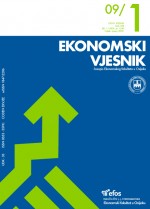Komparativna analiza tri najveća svjetska modela poslovne izvrsnosti
Comparative Analysis Of Three Largest World Models Of Business Excellence
Author(s): Jasminka Samardžija, Gordan KolakSubject(s): Economy, Business Economy / Management
Published by: Sveučilište Josipa Jurja Strossmayera u Osijeku, Ekonomski fakultet u Osijeku
Keywords: business excellence; TQM; Deming Prize (DP); Malcolm Baldrige National Quality Award (MBNQA); European Foundation Fund for Quality Management (EFQM) BE model; European Quality Award (EQA);
Summary/Abstract: Business excellence has become the strongest means of achieving competitive advantage of companies while total management of quality has become the road that ensures support of excellent results recognized by many world companies. Despite many differences, we can conclude that models have many common elements. By the audit in 2005, the DP and MBNQA moved the focus from excellence of product, i.e service, onto the excellence of quality of the entire organization process. Thus, the quality got strategic dimension instead of technical one and the accent passed from the technical quality on the total excellence of all organization processes. The joint movement goes to the direction of good management and appreciation of systems thinking. The very structure of EFOM model criteria itself is adjusted to strategic dimension of quality and that is why the model underwent only short audits within the criteria themselves. Essentially, the model remained unchanged. In all models, the accent is on the satisfaction of buyers, employees and community. National rewards for quality have an important role in promotion and giving a prize to excellence in organization performances. Moreover, they raise quality standards of companies and the country profile as a whole. Considering the GDP per capita and the percentage of certification level of companies, Croatia has all the predispositions for introduction the EFQM model of business excellence with the basic aim of deficit decrease in foreign trade balance and strengthening of competitiveness as the necessary preliminary work for the entrance in the competitive market of the EU. Quality management was introduced in many organizations. The methods used at that time developed in the course of years, and what are to predict is the continuation of the evolution road model as well as the method of business excellence.
- Issue Year: 22/2009
- Issue No: 1
- Page Range: 211-220
- Page Count: 10
- Language: Croatian

